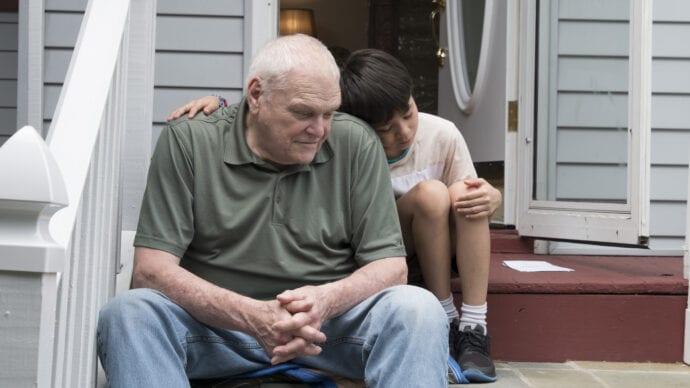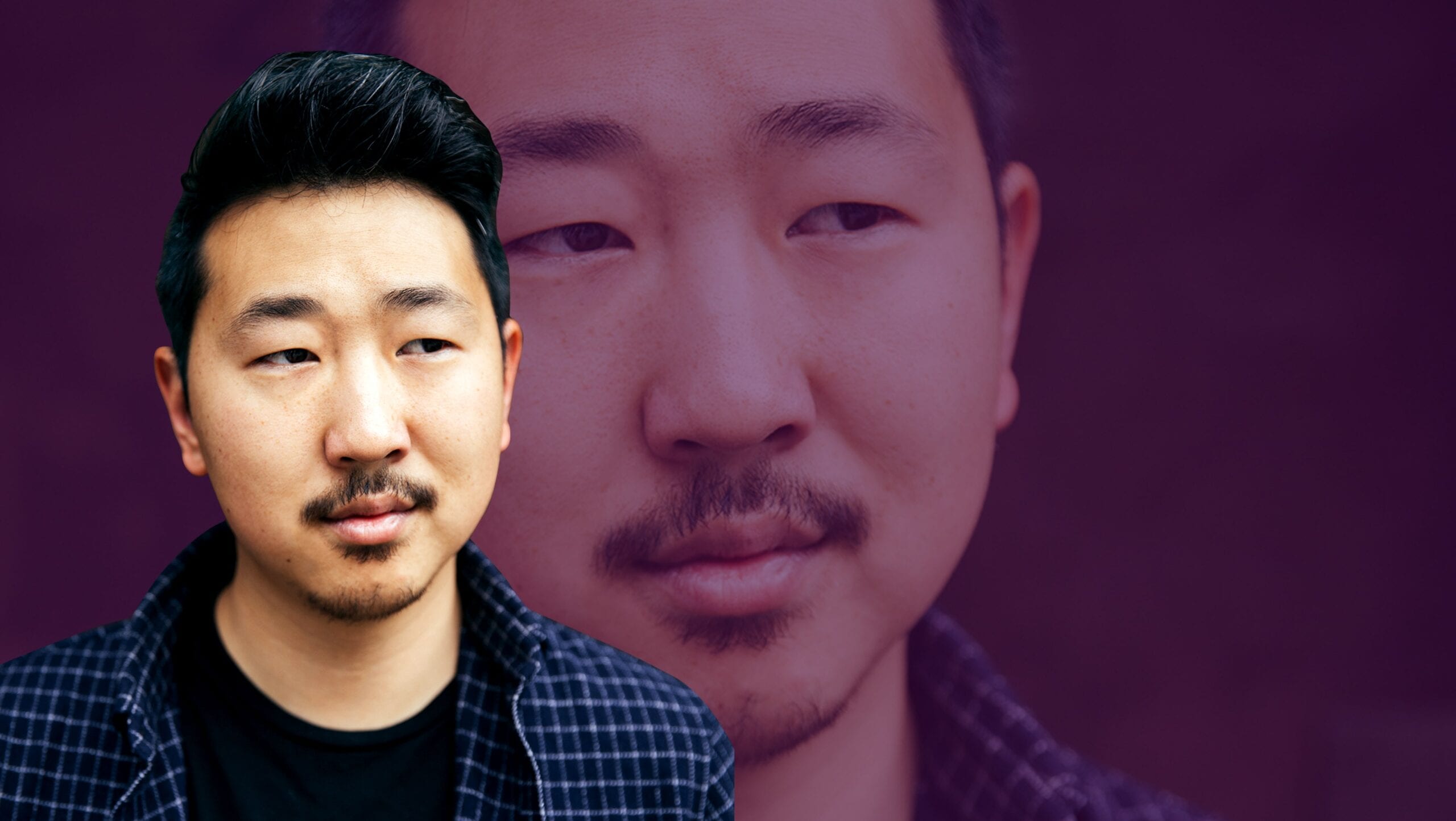Writer-director Andrew Ahn is clear about what he hopes his movies contribute to the queer film canon. “I don’t want to focus on homophobic villains,” he says over the phone from his hometown of Los Angeles. “That’s not what I’m interested in.” Instead, the Korean-American filmmaker says he wants to tell “stories where the drama is fuelled, not by a villain or by hatred, but by love.” Spa Night, his well-reviewed and award-winning 2016 feature film debut, does just that. It’s about a first-generation Korean American whose love for his family conflicts with his own budding desires. Similarly, Driveways, Ahn’s recently released sophomore feature, explores the unexpected relationship between Cody, a lonesome boy (Lucas Jaye), and Del, the retiree who lives next door (played by the late Brian Dennehy in one of his final roles). Ahn’s perspective remains, unfortunately, a fresh one. Just consider how many productions by and about LGBTQ2 folks that centre on our struggles—apparently, being queer or trans and being happy is still a novel idea. Driveways, a double nominee at the Film Independent Spirit Awards earlier this year (for its female lead Hong Chau, and screenplay by Hannah Bos and Paul Thureen), is an interesting addition to the queer canon. That’s because the film, released digitally this week (on Amazon, iTunes and other streaming services), isn’t expressly queer and doesn’t include any explicitly defined LGBTQ2 characters (though Ahn is gay). Ahead of its online release, the Brown University and California Institute of the Arts graduate and I discussed the parameters of queer cinema, how Driveways came to fruition and what it’s like releasing an independent movie during a pandemic.
How did the opportunity to direct the film come to you?
One of the producers, Joe Pirro, saw Spa Night at Sundance—he really responded to the film and wanted to find something to work on with me. A few months after that, he was working with the writers for Driveways, Bos and Thureen, on the film’s screenplay and felt it could be a good fit for me. I don’t know why Pirro thought that the filmmaker who made a movie about having gay sex at a Korean spa should make Driveways, but it works. I read the screenplay and I loved how quiet and vulnerable and sensitive the storytelling was. That was exciting for me. And then I tried this thing that I’ve tried a lot in my career and has never worked until now, which is asking the producers, “Hey, what if I make them Asian?” And for the first time it totally worked.
The film is soft and quiet, almost to the point of having no plot. But it has a plot! How was it translating other people’s words into a film?
That’s the real joy of being a director, that you get to collaborate and interpret. And in many ways, being a writer-director—when you direct your own writing—that process is really hard. You get precious about your own writing. It’s really difficult to be just a director. And so, for me, this felt like a cool opportunity to really practise that skill with a story that I really responded to.
Admittedly, I watched Driveways because I saw your name and assumed it was going to be about some gays having sex in a driveway or something. That’s decidedly not what it’s about—sexuality isn’t mentioned at all, which is often a cornerstone of queer films. Do you see this film as a piece of queer cinema?
I think that’s a really interesting question. I don’t know if Driveways fits into that conversation, but I think it poses a question within the conversation. It’s this question of how do we talk about queerness? How do we talk about queer characters, queer culture, outside of defining sexual desire? That was something I explored really directly in Spa Night. And so, in some ways for me, Driveways felt like this interesting kind of opposite. In my mind I’m like, “Does Cody grow up to be queer?” Maybe.
Well there’s a necklace he wears that isn’t really mentioned much. I felt like that was some subtle signaling.
I think that there’s a sensitivity to his character that reminds me a lot of myself when I was a child, but that’s his choice to make, right? Whether he grows up to be queer or not, whether he grows up to tell his mom and come out or he gets married to a woman and has a family, that’s his choice. And for me, that perspective of “it’s a person’s choice” feels queer to me in philosophy, if not in actual definition. I think there’s also a queerness or a queer energy or queer sensibility just in terms of the idea of platonic intimacy and friendship.
For fans of Spa Night trying to figure out if they want to check this out, are there any throughlines between the two, besides what we’ve discussed already?
Well, I am a fan of the strong mom. I love these characters because I so often think, especially for Asian-American moms, the depictions are really stereotypical—either they’re super meek or they’re tiger parents. I wanted to show these characters in a way that feels authentic and feisty and alive, in a way that can expand the definition of what it means to be a mother. And gays love moms.

Brian Dennehy and Lucas Jaye star in "Driveways." Credit: Courtesy FilmRise
While Hong Chau, who plays the mother, is very much integral to the story, much of the plot centres on the cross-generational relationship portrayed by a very young actor and a significantly more seasoned actor. How was it working with them both?
I was really worried. I was scared because that friendship on screen has to feel as authentic as possible for the film to work. And Lucas, who plays Cody, and Brian, who plays Del… If they didn’t get along, I didn’t have a movie on my hands. So when they first met, it was the day before we started shooting. We all got lunch, and immediately there was an intense respect for each other. That blossomed into a really fun, beautiful, supportive relationship. I think that kind of relationship is something that would have been really cool to me as a child—to have someone who represents the old guard be open and accepting in a way that you might not expect. And so I let them be. I just facilitated their friendship and watched the magic happen.
A lot of filmmakers want audiences to see their films on a massive big screen in a theatre. That can’t happen right now. How do you feel about Driveways finally coming out, particularly at this moment when digital downloads and rentals are the only ways people can see it?
It’s been a real journey with the film. We premiered in Berlin last year and screened it at Tribeca in the spring, so it’s been a long festival journey for us. I would have loved for audiences to have seen Driveways this month on the big screen and in movie theatres. But I also really do understand the necessity of what we’re doing and that these shelter-in-place and physical distancing measures are saving lives. So I’m not going to complain. And in some ways maybe it’s a really lovely opportunity for people to see a film about home, at home. This is a movie about family and connection, and is something that you can enjoy in your most intimate space. And so I hope that audiences give this a chance and watch with open hearts, because it is a movie that speaks really quietly but has important things to say.


 Why you can trust Xtra
Why you can trust Xtra


